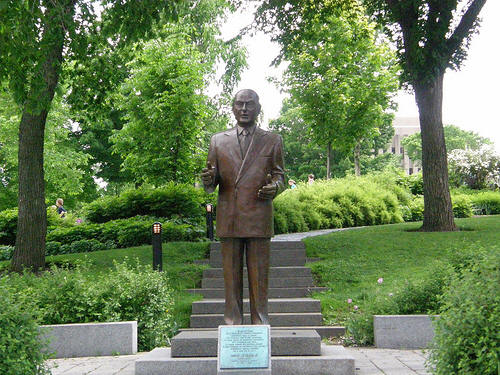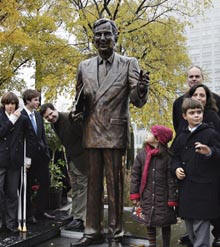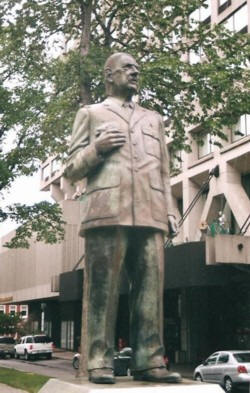I keep thinking about the Kennedy assassination. It’s the only other event I can remember that parallels, in my mind, the impact of this catastrophe. At the time, people compared Kennedy’s violent death to Pearl Harbor, and the death of Roosevelt, so I guess that makes the lineage clear: Pearl Harbor, Roosevelt’s death, Kennedy’s Assassination, the World Trade Centre. In a league of their own.
Only four men died, initially, in the Kennedy Assassination– if you don’t count all those “mysterious” deaths of witnesses– but one was the youngest, brightest, and most forward-looking President in the history of the U.S. The others included one of the most baffling figures in American history: Lee Harvey Oswald. Oswald allegedly also killed Officer J.D. Tippit (one of the most puzzling peripheral characters in this drama) and was killed, in turn, by Jack Ruby, who, in turn, died of cancer in prison.
It is to the eternal shame of the Warren Commission that it did not create a sensation with a detailed biography of Lee Harvey Oswald, who joined the Marines, helped service U-2 spy planes in Japan, spoke fluent Russian, defected to the Soviet Union, married a Russian, defected back to the U.S., wandered around Dallas and Irving, Texas, and New Orleans, in the company of CIA agents and provocateurs, anti-Castro Cubans, and gay gun-runners and erstwhile assassins, and whose best friend in Dallas was a strange ex-Nazi CIA informant George De Mohrenschildt. Lone nut? Are you kidding? He had the craziest social life in Texas.
I just played back a speech Kennedy made in Houston on November 22, 1963. Someone converted it to an MP3 and put it up for file-sharing. (I love the internet.) He talks about 1990– I’m not kidding. In 1990, we will need three times as many spaces at our colleges and universities. In 1990, we will have long since landed on the moon and will have embarked on a new phase of the space program (the shuttle?). He talked about big government programs that would benefit all citizens. He talked about human progress and development.
Shameless, wasn’t it? One of the hallmarks of this age is that most of us would heap scorn and ridicule on big government programs even though those programs included civil rights, our highways, the internet, our defense systems, NASA, and the near destruction of organized crime.
There was a lot of innocence and optimism. The government of the United States can set it’s mind to a seemingly impossible task– landing a man on the moon — Johnson followed with a war on poverty– and accomplish miracles. It is amazing to me that Kennedy succeeded is his most grandiose project– though he never lived to see a man on the moon. He even succeeded within his schedule, before the end of the decade.
Kennedy’s charisma and wit were extraordinary. He describes a new booster rocket used in the space program and mispronounces “payload” into “payroll”. He pauses a second and then says, “it will be the largest payroll too… who should know that better than Houston?” and the audience roars with laughter. It’s not just the wittiness of the remark, but his timing, his utter confidence and charm, and total command of the facts and detailed information– correct names, numbers, statistics, (which, like it or not, was also a remarkable ability of Bill Clinton.) You had the extraordinary sense that he was probably smarter than his advisers.
This was a man so confident in his own abilities that he allowed film-makers to follow him around the White House recording every moment of the day. Nothing was staged or phony– these were real meetings and phone-calls. There was an extremely circumspect, tense phone call to a segregationist governor. There were discussions about how to deal with the crowds of segregationists blocking school entrances. It was extraordinary. I have not seen footage like this of any president since.
Kennedy wasn’t remotely perfect, of course, and it’s hard to tell where he was going since his administration was cut short. But he made a number of “helluva” good decisions and judgments under enormous pressure (the Cuban missile crisis, dispatching the National Guard to Mississippi), and he was arguably moving towards withdrawal from Viet Nam because he believed that the government of South Viet Nam did not have the support of it’s own people (it didn’t). And while Hoover’s FBI, terrified or indifferent, had made no progress against organized crime in 20 years, Bobby Kennedy turned the crime families upside down. By the way– the wonders of the Internet age– you can download a lot of Kennedy’s speeches through Morpheus or other file-sharing programs (along with the Zapruder film)– quite amazing. Listen for yourself. Has anyone sounded that articulate, and that visionary, in a million years?
By 1972, Nixon was talking about how best to withdraw, and that was probably the greatest difference between Kennedy and those who followed him: he thought ahead. He didn’t want to allow himself to be put into the position of having to “withdraw”. He wanted the nation to be somewhere farther along in science and education and culture 20 years down the road. He knew that new technologies would remake industrial America if the education system provided the talent and skills needed.
He was talking about 1990. He was thinking about quagmire. He reluctantly accepted the Bay of Pigs invasion, planned during the Eisenhower Administration, but when it failed he fired the people who planned it and had assured him it would succeed (one of these was the brother of Earle Cabell, the mayor of Dallas in 1963). He initially did not think America was ready to step ahead on civil rights but when Martin Luther King forced the issue, he realized there was only one path to follow, because there was a future and you had to think about that.
I think most people intuitively understood that the Warren Commission was a sham. The Zapruder film was withheld from the public for ten years because it was bought by Time-Life which was managed by C.D. Jackson who was a friend to the CIA and who kept it away from the public, possibly because it didn’t show what the Warren Commission claimed it showed. Dan Rather, the fatuous old ass, did see the film and publicly claimed that it showed Kennedy’s head jerking “forward” with the last shattering bullet. Then he assured America that all was well and that the constitution had worked and the peaceful transition of power had occurred. I have a feeling that a Chilean Dan Rather spoke similar words in 1973 in Santiago, with kind words for Pinochet.
In spite of this tacit complicity with the coup, media coverage of the assassination was genuine and stunningly compelling, probably because they didn’t know how to do it yet. There was no “The JFK Assassination” logo, no theme music, no pimped-up collagen-faced newsreaders with their best-rehearsed tragic faces, as there was in September 2001. Reporters didn’t habitually encourage people to cry on camera. News organizations routinely waited for confirmation before releasing new details.
There was Cronkite with a catch in his voice as he announced the death, sitting at a makeshift studio, reading the news on paper as it was handed to him, removing his glasses. The difference was that Cronkite was a newsman, a real reporter, who understood the significance of the story. And those men behind him at the teletype: real people, not props. And there was the incredible KBOX radio broadcast, live from the route ” something has gone terribly wrong with the motorcade…”. It was a reporter who was not yet trained on how to “package” a tragedy.
Anyone who is old enough probably remembers that the impact of the Kennedy assassination on the world was as great, if not greater, than this WTC attack. People stood on street corners in stunned disbelief. They crowded around stores watching television. Complete strangers began talking intimately. Men bit their lips and wept and young girls wailed in grief.
And it was a similar loss of innocence. This young, vibrant, popular president who was almost certainly headed for a second term, was suddenly replaced with the master of the back-room deal (not that Kennedy wasn’t), the sly old Lyndon Johnson. Nothing against Johnson– I think he was a better president than people give him credit for though his decision to escalate the American commitment in Viet Nam was was his undoing– but he didn’t have nearly the vision of Kennedy, or acute sense of what could or could not be accomplished, and at what cost. Johnson was old-style party politics, with cigar-chomping brokers, party favors, and big campaign contributions from vested interests.
[2022-04-27: I amend this: Johnson actually passed several visionary, milestone pieces of legislation. But he was absolutely underestimated on domestic policy, and disastrously wrong about Viet Nam.]
Most people probably felt they didn’t fully understand what had happened or who was responsible. But the idea that they would choose a man to be their leader and that their sacred right to do this was unabridged and incorruptible was skewered.
Johnson was defeated by Viet Nam, and Nixon by Watergate, and Carter by the “debacle in the desert” (anyone remember Ken Taylor). What is it with the U.S. and the Middle East?
I don’t know if it was Oswald alone or if Oswald even fired a shot. The paraffin test failed to pick up gunpowder on his fingers, and it seems a stretch to believe he was able to fire three shots, hide the rifle and remove his fingerprints, descend to the second floor and buy a coke before building manager Roy Truly and police officer Marion Baker ran into him in the lunch room.
I know the Warren Commission was totally concerned with convincing America that all was well and didn’t have the slightest interest in actually analyzing the crime. I know the autopsy was performed by a forensic pathologist named Humes who had no experience with gunshot wounds and couldn’t draw the correct conclusion until he was told what it was. But there are so many crack-pot conspiracy theorists out there that it’s hard to sort out the truth anymore. Most Americans seem to have come to the conclusion that there probably was a conspiracy. Someone changed the direction of history. Someone led us to Johnson and Nixon and Ford (who was on the Warren Commission) and Carter.
It wasn’t until Reagan came along that I think America realized it had finally emerged from it’s own quagmire, the nightmare of assassinations and wars and hijackings and oil crises, that seemed to have enveloped the 60’s and 70’s. They turned to Reagan after four smart presidents (Kennedy, Johnson, Nixon, Carter) and the world, by coincidence, changed dramatically at the same time. The cold war was over. The internet age had begun. A new era of unparalleled peace and prosperity emerged.
The Kennedy assassination followed a decade of relative peace and prosperity, as did the WTC. Kennedy won the narrowest of victories over Nixon. We all know about George Bush Jr.’s margin. Kennedy seemed to be entrusted with a new decade of progress and technological marvels. Bush inherited the first surplus since… Kennedy.
Kennedy’s assassination, like the WTC, was captured on video (film) and live on radio. The world watched in stunned disbelief. America was relatively isolationist under Eisenhower, but Kennedy launched the Peace Corps and a new era of activism abroad (Ich bin Ein Berliner). Bush seems to have started his administration with a return to isolationism, rejecting international treaties and choosing to “go it alone” on several international issues.
And now, the U.S. embarks on a declared war on terrorism, which, for me, bears an awful echo of Viet Nam. I don’t know if the results will be the same or not. There is an impressive tone of optimism out there about America’s ability to defeat terrorism, and just because America was equally optimistic, in 1965, about it’s ability to save Viet Nam doesn’t mean the results will be the same this time. But I think any thoughtful person would consider the question.



